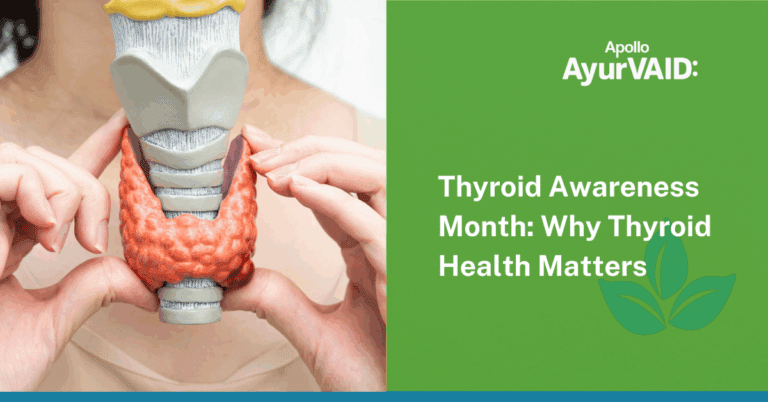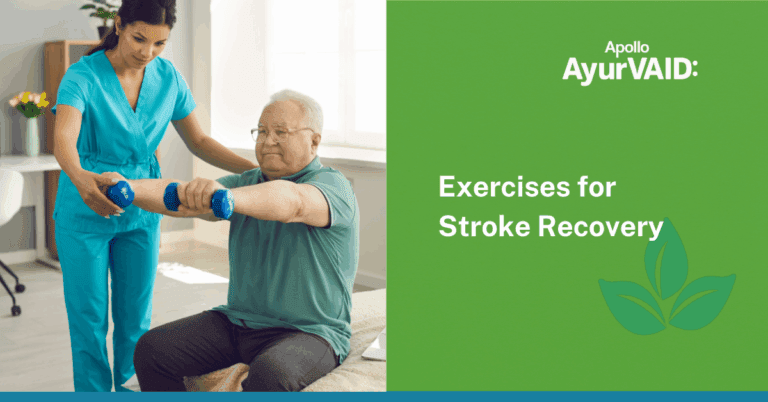Introduction
Every World Ayurveda Day / National Ayurveda Day, I pause to remember why I chose Ayurveda: to help people feel better, not only with medicines, but also through food and lifestyle changes, as mentioned in Ayurveda—the science of life in its true sense. On 23 September 2025, as we mark Ayurveda Day under the theme “Ayurveda for People & Planet”, let’s keep the conversation simple, practical and honest.
At Apollo AyurVAID, we see patients every day who want clear answers: Is Ayurveda safe? Is it scientific? Can it help my chronic pain, my digestion, my sleep? My answer is always the same — yes, when it’s practised as Ayurveda was taught: thoughtful, individualised, and evidence-minded.
Authentic Ayurveda — Not “Mixopathy”
Busting myths
- Myth: Ayurveda is a pseudoscience.
Ayurveda is a knowledge system built on observation, logic, and clinical practice. Its texts describe diagnostics, formulations and procedures that were refined over centuries but are now being tested with modern methods. - Myth: herb-induced liver injury (HILI) = Ayurveda.
Most reported liver injuries linked to herbs come from adulterated, mislabeled or unregulated supplements—not from properly prescribed, classical Ayurveda medicines dispensed under supervision. The confirmatory tool to claim a herb as a causative factor was missing in many of the claims on HILI by Ayurveda medicines. Quality, sourcing and correct dosing matter. - Myth: Home remedies, folk remedies, spices and herbal extracts are Ayurveda.
Home remedies, spices and herbal extracts are part of Ayurveda, but not all are from Ayurveda. A folk potion found in a market or a single-herb extract sold online often lacks the classical processing, standardisation and individualised prescription that Ayurveda requires. - Myth: Ayurveda doesn’t have side effects.
Anything that has an effect will have side effects. Always consult a qualified Ayurveda physician before starting any Ayurveda medicine for proper dosage and duration guidance.
Misuse by a few does not disprove the system. Any medical system can be misused. The remedy is stronger regulation, practitioner accountability and patient education — not dismissal of Ayurveda itself.

Food, lifestyle and daily routines — the heart of Ayurveda
Ayurveda teaches that food and habits are the first medicines. A classical verse says:
पथ्ये सति गदार्तस्य किमौषधिनिषेवणैः ।
पथ्येऽसति गदार्तस्य किमौषधिनिषेवणैः ॥
(If one eats what is wholesome for them, what need is there for medicines? If one eats poorly, medicines alone won’t help.)
Food as medicine: Favour fresh, seasonal, whole foods tailored to your constitution. Choose cooling foods and hydrating choices in summer; warm, nourishing meals in winter; lighter, freshly cooked meals during the monsoon. Spices are not just for flavour—used correctly, they aid digestion, metabolism, and immunity. Mindful eating (no screens, listen to hunger and fullness cues) is as powerful as any pill.
Daily routine (Dinacharya) and sleep: Aim for consistent sleep and wake times. Ideally, sleep before about 10 pm and rise with the early light where possible. Begin your day with warm water, gentle stretches, and a few minutes of mindful breathing — simple steps that set digestion and mood for the day.
Meal timing, the digestive clock: Your agni (digestive fire) is strongest at midday; make this your main meal. Keep breakfast and dinner lighter and avoid heavy late-night meals or constant snacking that weakens digestion.
Seasonal care (Ritucharya): Adapt, don’t complicate. In spring favour light, mildly cleansing foods; in summer choose cooling and hydrating options; during monsoon prefer freshly cooked, spiced food to support digestion; in winter select warm, slightly oily foods to protect tissues. These small seasonal tweaks prevent common imbalances without overhauling life.
What Authentic Ayurveda Care Looks Like for You
If you’re considering Ayurveda care, look for these signs of quality:
- A thorough assessment of your constitution and lifestyle, not a one-size-fits-all prescription.
- Clear sourcing and quality certification for medicines.
- Integration with modern tests when needed (blood work, imaging) and open communication with your other healthcare providers.
- A treatment plan with measurable goals and timelines, including dietary and lifestyle advice you can follow at home.
Why Patients Choose Ayurveda
A simple closing note -
On this Ayurveda Day, here’s why you — as a health seeker — might choose Ayurveda: it’s not about mystery or magic, it’s about personalised care that looks at you (your body, mind and daily life), clear-cut safety standards, and treatments grounded in both centuries of clinical wisdom and modern research. At Apollo AyurVAID, we prioritise patient education so you understand what’s being prescribed, transparent manufacturing so the medicines you take are tested and traceable, and clinical research and pharmacovigilance so side-effects are tracked and avoided.
Put simply — choose Ayurveda when you want care that:
- treats the whole person (not just symptoms),
- gives practical, everyday steps you can follow (diet, routine, stress tools),
- uses medicines prepared and monitored to modern safety standards, and
- works alongside modern tests and treatments when needed.
That’s the Apollo AyurVAID way: compassionate care you can trust, safety you can verify, and evidence you can rely on.






